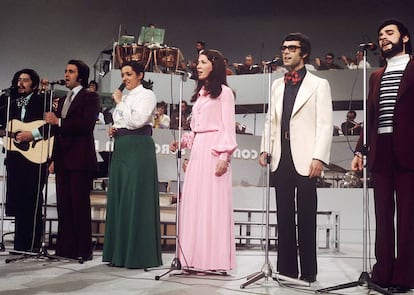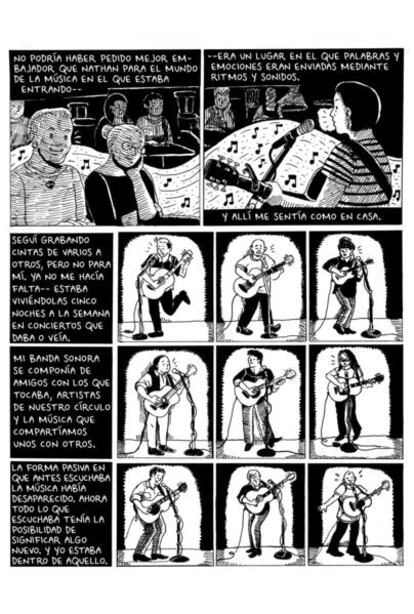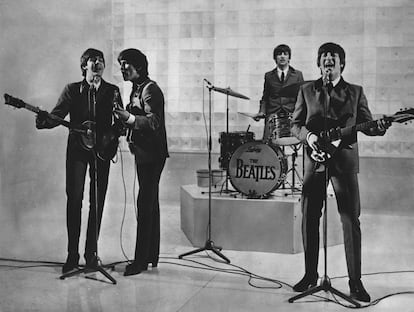When music inspires literature: Award-winning writers reveal their life-changing songs
Contemporary authors owe musicians a debt of gratitude, admit creators such as Sergio Ramírez, Wendy Guerra, María Fernanda Ampuero and Summer Pierre

It is not only the first book ever read or the fairy tales told by grandparents that have provided inspiration for literature. Increasingly, writers are claiming that music has offered them divine tutelage. Many admit that their calling came to them when they were children not through other books, but through songs with lyrics that left stories and feelings imprinted on their minds, even if they were sometimes difficult for a young mind to grasp.
Literature’s debt to music as the spark that awoke the desire to write is evident in names such as Sergio Ramírez through boleros, Wendy Guerra with Cuban sones, Lorena Salazar Masso via Nina Simone, Miguel Ángel Oeste and the Beatles, María Fernanda Ampuero with ballads from the 1970s and 1980s and Summer Pierre’s love of Suzanne Vega.
The first breath of inspiration for the Nicaraguan writer Ramírez, winner of the Cervantes Prize in 2018, came from pure sentiment. “I come from the time of the romantic boleros, the first of which I remember was Dos gardenias, sung by Daniel Santos on an old gramophone, and from the cumbanchera music that was danced to in the old Mexican movies with the tropical sets, the palm trees and timbales drums, sung by María Antonieta Pons, Tongolele, Ninón Sevilla and Rosa Carmina. And I was steeped in the music of my uncles and aunts, performed by them in the Ramírez orchestra, whose members used to rehearse in my grandfather Lisandro’s house, from foxtrots to waltzes and back to boleros.”
The Cuban writer Wendy Guerra, 50, comes from more upbeat rhythms. She recalls the time she was a young girl in Martí park in the town of Cienfuegos when Barbarito Díez performed with Antonio María Romeu’s band: “He was standing stiffly, keeping his emotions in check; what I heard that night, the music and the lyrics, changed my way of understanding things.” What Guerra heard was La cleptómana, with music and lyrics by Agustín Acosta and Miguel Luna, which “told the story of how a mysterious woman stole everything she could from an old store and also described the place and the manner in which she did it with enigma and sophistication that is rare in Cuban music, which typically details everything and keeps no secrets.” Later came the old ballads, sung by María Teresa Vera and Compay Primero Lorenzo Herrezuelo. Anonymous songs like El colibrí (The hummingbird) transported Guerra on “a journey of hidden stories that I needed to waken and recompose” – a journey she says she remains on.

For María Fernanda Ampuero, a 39-year-old Ecuadorian writer and one of the rising stars of Latin American story-telling through her books Cockfight and Human sacrifices, it was impossible not to hear Spanish ballads and Latin American pop music. “It was always playing in mu house and on the 10-hour trips from Guayaquil to Quito. My father was a music lover, he had boxes of CDs and cassette tapes that he recorded himself.” These included music ranging from Spain’s Mocedades and Julio Iglesias to Emmanuel and Ana Gabriel and many artists from the 1980s. “This whole lather of tragic songs, and then the pasillos my grandmother would listen to, and later my own choices, like Mecano, where every song is a story, are part of my literary education, Ampuero says.
As Darío Jaramillo said in 2008, in his book Poesía en la música popular latinoamericana: un cancionero (or, Poetry in Latin American popular music: a songbook): “These songs molded the way of feeling and the way of expressing love in several generations of Latin Americans. There is a poetry in these songs that is different from the poetry of reading in silence. They have a different rhetoric and esthetic. There is poetry to see and poetry to hear,” wrote the Colombian poet, author and essayist.
“When I heard Nina Simone sing, I thought about how I wanted to write like she sang. Because of the power she has when she sings and because she understood her songs like poems,” says 29-year-old Colombian writer Lorena Salazar Masso, who recently published her debut novel Esta herida llena de peces (or, This wound full of fish).

The Spaniard Miguel Ángel Oeste recounts a similar experience. His novel Arena (or, Sand) opens with a line from Spanish indie rock band Los Planetas: “If it’s okay, if it’s so easy, why does it hurt so much inside?” Oeste was 10 when he discovered the music that would shape his life. It was a way of experimenting with the feelings and emotions described in the songs as though they were his own. “I was fascinated by this almost infinite capacity a good pop song has to immerse us in other realities and sensations. Probably that’s where my first connection with the written word came from. In those Beatles lyrics that evolved from their most simple (‘she loves you yeah yeah yeah’) to more complex ones, almost literary, in which they created characters with their own lives (Eleanor Rigby), or those that spoke to us about taboo subjects like death. Later also in those Los Planetas lyrics that were able to transmit a strong emotional, even political, charge.”
One member of the latest wave of writers to combine literary and musical notes to explain the influence of music on their vocation is the comic book artist Summer Pierre, whose graphic novel All the Sad Songs was nominated for an Eisner Award. The song that awakened the literary inspiration in this American artist, who is a contributor to the The New Yorker and The New York Times, was The Queen and the Soldier by Suzanne Vega. She was 17 and had never heard a song like it. “It was like a story, but in a song. It has no chorus, it was a long ballad, a beautiful and touching story about a soldier who tells his queen he is no longer fighting for her. It’s a beautiful tale where you can clearly visualize the image of the young and fragile queen and the angry yet tender soldier.”
Beyond providing inspiration for other forms of art, music is also a refuge and a lifeline. That was the case for Ramón Andrés, who recently won the Spanish National Essay Award for his work Filosofía y consuelo de la música (or, Philosophy and solace of music), which he admits was born in a house where everything was discord. “My father was an amateur violinist and my sister was studying singing. At the age of just four I felt that music was saving me from that violent chaos. It was a constant liberator. I have never been separated from it. Music has been my shelter. Studying music and writing was the only thing that interested me and that impulse has brought me here today.” Andrés was a professional musician for a decade but in 1984 he decided to dedicate himself to writing. “In reality, I have never left music, it is with me every day, I write about it, I think about it, I owe everything to it; it’s my salvation.”
Why music awakens never-before-experienced feelings and emotions in children and adolescents is a mystery. Alex Ross, a music reviewer for The New Yorker and author of books including The Rest Is Noise: Listening to the Twentieth Century and the recently published Wagnerism: Art and Politics in the Shadow of Music, explains it like this: “Listening to music is a kind of trance: the most cognitive part relaxes and remains in the background. Sounds speak to us in a language that guides us through our inner self and leads us to unfamiliar ideas, feelings and emotions.” Like feeling the impulse to translate that experience into the writing of books.
Tu suscripción se está usando en otro dispositivo
¿Quieres añadir otro usuario a tu suscripción?
Si continúas leyendo en este dispositivo, no se podrá leer en el otro.
FlechaTu suscripción se está usando en otro dispositivo y solo puedes acceder a EL PAÍS desde un dispositivo a la vez.
Si quieres compartir tu cuenta, cambia tu suscripción a la modalidad Premium, así podrás añadir otro usuario. Cada uno accederá con su propia cuenta de email, lo que os permitirá personalizar vuestra experiencia en EL PAÍS.
¿Tienes una suscripción de empresa? Accede aquí para contratar más cuentas.
En el caso de no saber quién está usando tu cuenta, te recomendamos cambiar tu contraseña aquí.
Si decides continuar compartiendo tu cuenta, este mensaje se mostrará en tu dispositivo y en el de la otra persona que está usando tu cuenta de forma indefinida, afectando a tu experiencia de lectura. Puedes consultar aquí los términos y condiciones de la suscripción digital.








































